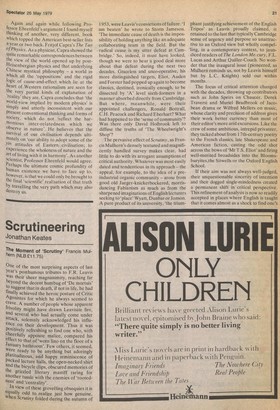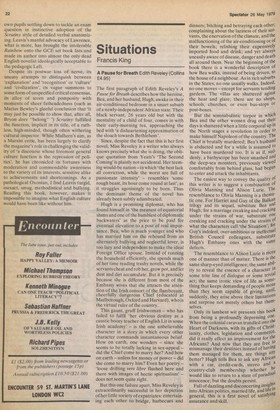Scrutineering
Jonathan Keates
The Moment of 'Scrutiny' Francis mulhem (NLB £11.75) One of the most surprising aspects of last Year's posthumous tributes to F.R. Leavis was their sheer magnanimity, reaching far beyond the decent humbug of 'De mortuis' to suggest that in death, if not in life, he had finally achieved the heroic posture of Critic Agonistes for which he always seemed to crave. A number of people whose apparent frivolity might have drawn Leavisite fire, and several who had actually come under attack, solemnly acknowledged his influence on their development. Thus it was Positively refreshing to find one who, with Cheerfully apposite malice, compared his effect to that of 'worn lino on the floor of a January bathroom'. Few others, it seemed, were ready to be anything but adoringly Platitudinous , and happy reminiscence of packed lecture halls, the open-necked shirt and the bicycle clips, obscured memories of the grizzled literary mastiff raring for another tussle with the enemies of 'rootedness' and 'centrality'. In view of these grovelling obsequies it is equally odd to realize just how genuine, When Scrutiny folded during the autumn of 1953, were Leavis's convictions of failure. 'I am beaten' he wrote to Storm Jameson.
'The immediate cause of death is the impossibility of holding anything like an adequate collaborating team in the field. But the radical cause is my utter defeat at Cambridge.' So, indeed, it must have looked, though we were to hear a good deal more about that defeat during the next two decades. Graceless and unco-operative, his more distinguished targets, Eliot, Auden and Forster had popped up again to become classics, destined, ironically enough, to be dissected by 'A' level sixth-formers in a manner absorbed directly from Cambridge. But where, meanwhile, were their appointed challengers, Ronald Bottrall, C.H. Peacock and Richard Eberhart? What had happened to the 'sense of community'? Was there only David Holbrook left to diffuse the truths of 'The Wheelwright's Shop'?
The pervasive effect of Scrutiny, as Francis Mulhern's densely textured and magnificently handled survey makes clear, had little to do with its arrogant assumptions of critical authority. Whatever was most easily dated and tendentious in its approach — the appeal, for example, to the idea of a preindustrial organic community — arose from good old Jaeger-knickerbockered, morrisdancing Fabianism as much as from the sharpened imaginations of English lecturers seeking to 'place' Wyatt, Dunbar or Jonson. A pure product of its university, 'the trium phant justifying achievement of the English Tripos' as Leavis proudly claimed, it retained to the last that typically Cambridge sense of urgency and purpose so unattractive to an Oxford view but wholly compel ling, in a contemporary context, to jaundiced readers of The London Me. cury, F.L. Lucas and Arthur Quiller-Couch. No wonder that the inaugural issue (pioneered, as Mlilhern reminds us, not by Leavis himself but by L.C. Knights) sold out within months.
The focus of critical attention changed with the decades, throwing up contributors such as John Speirs on Chaucer, Derek Traversi and Muriel Bradbrook of Jacobean drama or Wilfred Mellers on music, whose clarity and precision of address gives their work better currency than most of their editor's more arid excursions. Like the crew of some ambitious, intrepid privateer, they tacked about from 17th-century poetry to the French classics, late Shakespeare and American fiction, casting the odd shot across the bows of 'Mr T.S. Eliot' and firing well-merited broadsides into the Bloomsburyites,the Sitwells or the Oxford English School.
If their aim was not always well-judged, their unquestionable sincerity of intention and their dogged single-mindedness created a permanent shift in critical perspective. This refinement of analysis is now so readily accepted in places where English is taught that it comes almost as a shock to find one's own pupils settling down to tackle an exam question in instinctive adoption of the Scrutiny style of detailed verbal anatomizing. Leavis's manful advocacy of Lawrence, what is more, has brought the intolerable Rainbow onto the GCE set book lists and made its author into almost the only dead English novelist ideologically acceptable to the pedagogic Left.
Despite its postwar loss of nerve, its uneasy attempts to distinguish between 'explanation' and 'recognition' or 'culture' and 'civilization', its vague summons to some form of unspecified critical consensus, its alloy of scorn and pomposity with moments of sheer fatheadedness (such as Marius Bewley's gleeful conclusion that `it may just be possible to show that, after all, Bryon does "belong" ') Scrutiny fulfilled the function, implicit in its title, of a ruthless, high-minded, though often withering cultural inspector. While Mulhern's aim, as a Marxist critic, has been largely to clarify the magazine's role in challenging the validity of 'a discourse whose foremost general culture function is the repression of politics', he has chronicled its fortunes with moderation and commendable awareness to the variety of its interests, sensitive alike to achievements and shortcomings. As a pathological Oxonian, I find Leavis turgid, inexact, smug, methodistical and bullying. Reading this book, however, makes it impossible to imagine what English culture would have been like without him.



































 Previous page
Previous page